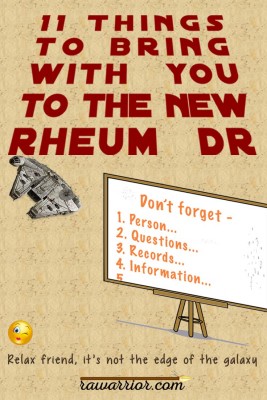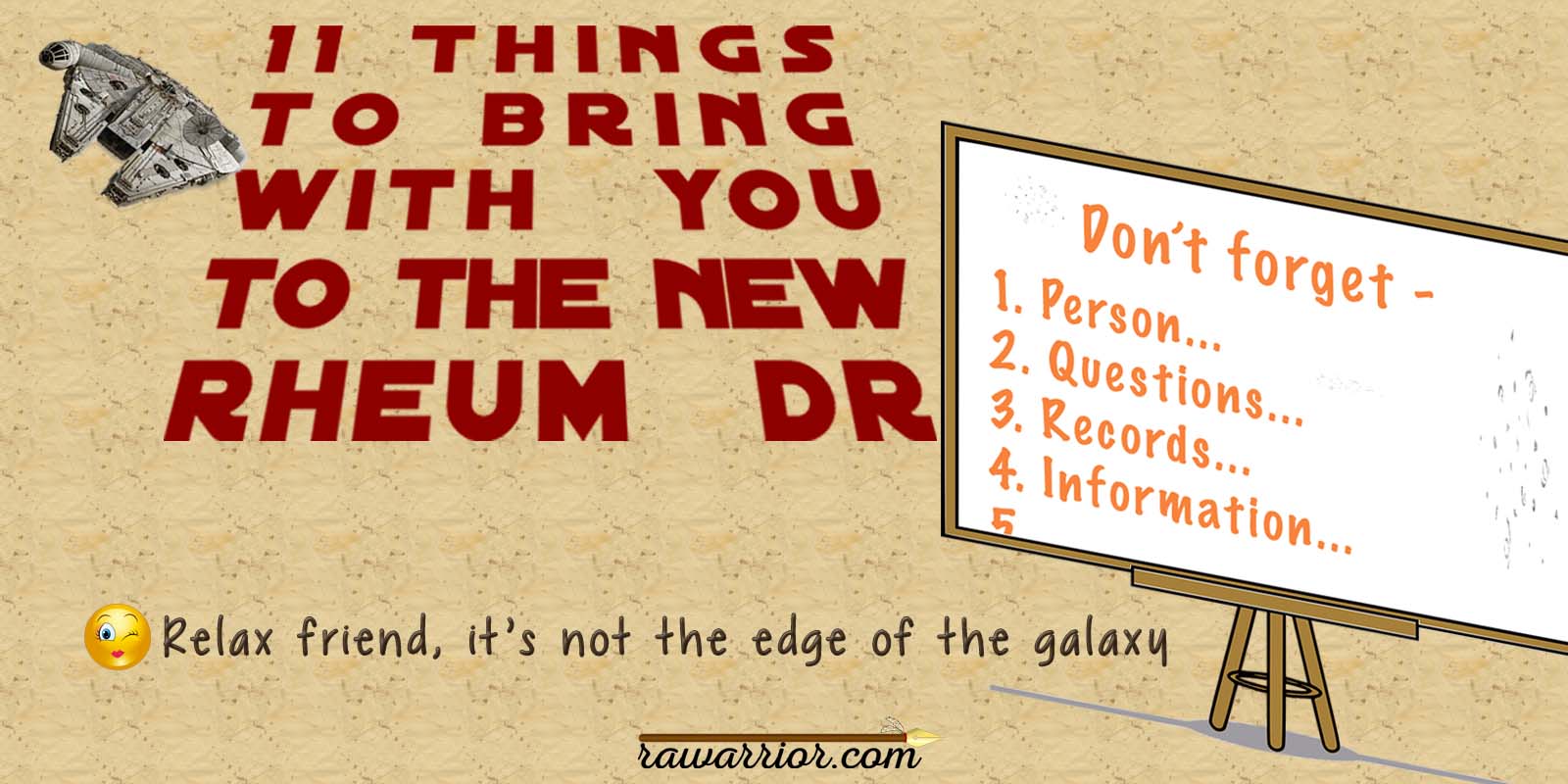Meeting the New Rheumatoid Arthritis Specialist
11 Things to bring with you to the new Rheumatoid Arthritis specialist (UPDATED 2016)
Meeting a new doctor, especially a rheumatoid arthritis specialist, can make you nervous. Of course you want her to understand your symptoms, make a correct diagnosis, and suggest the right treatments. You have high hopes for this meeting, so you want to prepare as much as possible. Here are a few things to think about ahead of meeting the rheumatoid arthritis specialist for the first time.
A couple of other posts you might want to bookmark:
Good example! Livedo reticularis diagnosis – she knelt next to me with a textbook
What should it be like? Joint Examinations with Rheumatoid Arthritis

1. Person: Bring someone to serve as a witness who also provides moral support. Choose someone who believes in you and will back you up one hundred percent. For example, choose someone who has seen your disease at its worst. Discuss in advance the role they should play. Do you want them to have the freedom to interrupt?
2. Questions: Some doctors are willing to look at a list of questions. Others prefer you only ask questions verbally. Regardless, carefully prepare your most important questions in writing so that you won’t forget what to ask.
3. Records: Bring all relevant medical records or lab results. It takes time to prepare and maintain your own set of records, but it is worth it for several reasons: You have them whenever you need them. You can know exactly what is in them, even having errors corrected. You can use them to make certain that every lead is followed. If this is a first visit, bring a folder with copies of relevant labs and doctor notes to hand over to the office to be added to your new chart.
4. Information: This one is the stickiest. Not because the toddler got PB&J on your folder… Surveys show that doctors are much less likely to use the internet than patients are. I’ve seen this firsthand. One doctor told me that she barely can email. Another laughed in my face at the mention of the internet. The radical website I mentioned? National Rheumatoid Arthritis Society (NRAS). Choose carefully what information to hand a doctor. Choose things like professional journal abstracts or articles on reputable websites like Johns Hopkins or Cleveland Clinic or a mainstream news source. Don’t expect him to respect information from a forum discussion whether or not it’s correct.
5. Notepad & pen: Or a tablet or whatever is comfortable to write down what you might want to remember. There might be a question to ask the doctor when you get a chance. There could be something to look up online when you get home. Maybe there will be instructions about how a prescription should be administered.
6. Meekness: Doctors are notorious for being defensive with patients who try to be involved in their own treatment plan. Hopefully, you’ll find one who is humble enough to have a productive conversation. Either way, you can do as much as possible to be respectful of her knowledge and the many years of training it took to become a rheumatoid disease / rheumatoid arthritis specialist. It’s easier to be nice if you realize that the last patient may have handed the doc a spam sandwich full of crazy ideas printed from the internet.
7. Moxy: Being polite does not mean being a doormat. The reason for the appointment is your own health, not anyone’s ego. It is vital to your health that you learn to clearly advocate what you need. Only you can inform the doctor of things that only you know such as how much pain you feel or whether a medicine is bringing you relief. If you have any concern, you should be able to discuss it. If you are told there is not time, politely ask for the time to have it addressed through another appointment or a short phone call.
8. Symptom / pain diary: If you keep any kind of symptom journal or calendar, bring a copy for the doctor to see. Make sure that any symbols or abbreviations are clearly explained. Ask that it be added to your chart.
9. Open mind: Hopefully, you have chosen a good specialist who can offer you expert advice. Listen carefully to ideas that are new. You don’t have to accept them, but you should at least examine them.
10. Sweater: In the USA, I have not been in a doctor’s office which is not at least 10 degrees Fahrenheit colder than the freezer section of the grocery store. If you wear layers, you can be comfortable with whatever the temperature is. This eliminates either sweating or shivering which can make you look and feel more nervous. I bring socks if I know that I will be made to disrobe.
11. Rolodex: Just kidding. But always keep in mind that you can use this when you get home. It may relieve some pressure to keep in mind that if this doctor does not listen or does not know the answer you need, you can try again. Yes, it’s exhausting and demoralizing to have to start over with another rheumatoid arthritis specialist, but you should have another chance if you need it.
The meeting with a rheumatoid arthritis specialist doesn’t completely depend on you, the patient. But you can be as prepared as possible for it to go well.
Recommended posts:
- Medical Records Tip for Your Rheumatoid Arthritis History: Read the Doctors’ notes
- 20 Tips for Managing Your Rheumatoid Arthritis Treatment
- 20 Questions RA Patients Should Ask a Doctor
- 10 Dumb Questions About an MRI for Rheumatoid Arthritis
- E-patients’ role in Healthcare Social Media: Do Doctors Hate Blogs?





Great tips, Kelly! You forgot #12 though… bring (yourself) a copy of this article so that you can remember all the things that will help make your visit a success 😉
EXCELLENT, EXCELLENT IDEAS !!!! great work Kelly!
Thanks!! I got lots of good responses via Facebook & Twitter. I’m realizing this list would work for others too. Funny to me because when I wrote it, I had only RA on the brain. :chic:
Really helpful we will be moving this summer and I have been dreading looking for a new Doc. This list takes away some of that dread.
Great advice! I have many doctor friends and they say that tip #8 can actually make a big difference in how they are able to understand the patient’s situation. If you can show them your pain journal that describes how your pain & symptoms progress through the day and night during a regular week it gives them a much clearer picture, and may also give them important information which can help them find better treatment for you.
For my own part I think #1 is most important. Sometimes the specialists may say very important things that you could miss or forget, and quite often they can say sad or hurtful things that you just don’t want to have to carry all on your own. And if nothing else, it’s good to have a witness who can laugh about it with you afterward… 😀
Don’t forget the most important thing, the Easy Button!! 😉
Well timed post Kelly – i’m due to see a new specialist tomorrow! I will take heed of your very useful advice..i already have a list of q’s to ask him – i maybe there a while, if he’ll let me..
Thanks again x
This is more info than ive had in 6 years! Im so gratefull to have stumbled onto this site and Kelly! I will use this info with my Rhumy to see my results if any…If it doesnt work out i will have to find another doctor..Thanks Kelly I belive knowlegde is power! Power to help myself..Gratefull
Thanks, Judi. That’s very true. Good luck to you.
Great post…I’d like to add a couple items.
Bring a photo of your hands, feet, knees, (whatever hurts) on a “normal day” and on a flare day. Personally I work nite shift and my worst times are after the end of my nite when I am stiff and swollen from getting up and down off my chair a million times a nite, and typing our nurses notes in the computer. It made a big difference for my rehumey to see what really bothered me and aggravated my RA.
Drink a whole bottle of water on your way to the office. Sometimes the docs will do their own labs, and if you are dehydrated and have multiple rotten veins after years of getting labs drawn, it makes it easier for the tech to find a vein.
Make friends with the doctors staff…bags of individually wrapped candies and fresh fruit never hurt, and it helps them remember you when you call in for something. I had done a lot of travelling until a year ago…I always bring back a treat from where I went. Macadamia nut Hershey kisses from Hawaii were their favorite….they still talk about them 4 years later (and I keep telling them they are welcome to donate to finance my next trip!)
Thanks, Laurie. Good points. 🙂
At first I thought those are on this post, but I realized their on different posts. I need to link those ones together somehow so it’s easier to find all of the ideas. Maybe I can divide the “talking to doctors” tag into 2 tags…? Here’s one of them: here.
Thanks foe the advice. I’m going to a new RA doctor in April & I’m super nervous! Im hoping this guy will be betterr than the last.
Wow, I hope so. Maybe if you read some of the humorous stories on here about the things that have happened, it will make you more comfortable. Here’s one – click here.
Hi Kelly
I am seeing my new Rheumatologist tomorrow. Back in November I wrote the same thing (but can’t remember which blog). I haven’t given feedback until now. Back then I set off to see my new Rheumatologist with my best mate and my mum in tow. Only about 2 1/2 hrs drive, but we decided to have a girls couple of days away. The boys were on their hollies (meaning my Rotties were at their kennels) and off we set. Leaving plenty of time for coffee stops etc we arrived at the hotel with 2hrs to spare.
A while later, we headed of to the Rheummy and when we got there, they had only made a 15 minute appointment for me and not the customary 45 minute appt for a new patient. I had sent the referral etc etc, they had even rung to confirm my appt time and vice versa so I was a little taken aback and was remarkably calm, even when they said “No he CAN’T see you today – but we could try for February”. I mean just how much could be achieved at a 15 minute 1st appt with someone anyway?
I was startled, surprised and a whole lot more. I had waited for the pretty much normal three + months and I guess I had built up my hopes after a not so good 1st Rheumy and his indifference. The message I got before I left the clinic was “Doctor doesn’t make exceptions for people just because you come from out of town” – wow did I feel small at that point?
I had a myriad of things rushing through my head, but said little as I didn’t want to say something I might regret later. In fact I think I would have just cried at that point and I wasn’t going to do that.
I decided that I also wasn’t going to let this spoil our ‘girls time’ and so it didn’t, but afterwards I did struggle with the disappointment. I guess I had hoped that things might change with that appt – but obviously not. What did change though, was the fact that I spoke to my GP and decided that maybe that happened for a reason and so I am seeing another Rheummy (at the same practice) tomorrow (God willing). I have prepared ‘my folder’ and included all the info that I can think of (thanks to your list) and just hope that I have a good appt. Regardless, I will write about it this time – I might even dare to be hopeful. Maybe I should have taken that Rolodex in November after all 😀
I love the rolodex joke – I’d love to hear how it went!
Oh goodness, thank you for posting! I am having bloodwork done at PCP on Monday and then see my first of two scheduled Rheumatology visits (2 different docs to see which one will be closest to my game plan for my life) on Thursday, so this came JUST IN TIME! I am planning on taking my mom with me bc my hubs has already taken so much time off work. And if anything, they can be there to write all the info down for you if in case you’re having a “bad hand day” that day and writing seems like it isn’t going to happen! I’m nervous and terrified, but need to get to the bottom of all this…..I’m going C-R-A-Z-Y!!!!!!!!!
I would add that perhaps you bring a pre-populated typed form with some of the basic information requested in many new patient profiles (Past medical history, primary care doctor, current medications, etc). I have been shocked at the request to complete lengthy paperwork requiring writing information out by hand that happens even at my rheumy doctor’s follow-up visits. It is clear that the idea that this could be difficult/painful or even impossible for some patients has never been considered. Then when you are handed the forms, you can just complete what is missing or necessary for that visit. Doctors that treat such patients need to come into the computer age and have touch screen standard forms or questionnaires for such purposes, but I am not holding my breath on that one.
I really like my rheumatologist. We have been together for 25 years. However, lately, he had focused more on my lab results and less on clinical manifestations–ie, accelerated crippling and pain. I had to tell him last visit that I can hardly walk and have to spend most of my time at home in order to convince him to change my bioligic.